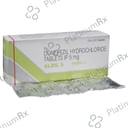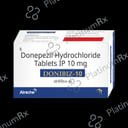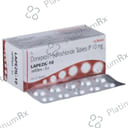Donepezil
Uses
Donepezil is used in the treatment of Alzheimer's disease and dementia associated with Parkinson's disease. It should be administered to patients with moderate to severe Alzheimer's disease.
How it Works
How Donepezil works Memory loss in Alzheimer’s disease occurs due to disturbances in signal transmission in the brain. Donepezil is a cholinesterase inhibitor that works by increasing the levels of a chemical messenger, acetylcholine, which is involved in the transmission of nerve signals. This enhancement improves memory and cognitive function.
Side Effects
Common side effects of Donepezil include nausea, diarrhea, insomnia (difficulty sleeping), weight loss, and accidental injury.
Expert Advice
- You have been prescribed Donepezil to slow the progression of Alzheimer's disease.
- It does not cure Alzheimer's disease but may help improve brain function and the ability to perform daily activities.
- Take it with or without food, preferably at night before going to bed.
- Possible side effects include diarrhea, nausea, and vomiting.
- Drink plenty of fluids to stay hydrated while taking Donepezil.
- Monitor your body weight regularly, as both Donepezil and Alzheimer's disease can lead to weight loss.
- Do not drive or engage in activities that require mental focus until you understand how Donepezil affects you.
- Exercise caution while taking this medication if you have a peptic ulcer, as it may cause vomiting, stomach bleeding, stomach pain, or discomfort.
- Inform your doctor if you develop muscle tremors, especially if you have Parkinson’s disease.
- Notify your doctor if you experience seizures or convulsions while taking this medication.
Other Combinations
Donepezil + Memantine
Related Medications
Donepezil 23mg

₹244.7

₹323.7
MRP ₹394.7
Donepezil 23mg

₹323.7
MRP ₹394.7
Donepezil 5mg

₹100

₹63.3
MRP ₹126.5
Donepezil 5mg

₹91.4

₹63.3
MRP ₹126.5
Donepezil 5mg

₹129.4

₹63.3
MRP ₹126.5
Donepezil 5mg

₹118.4

₹63.3
MRP ₹126.5
Donepezil 5mg

₹60

₹63.3
MRP ₹126.5
Donepezil 5mg

₹85

₹63.3
MRP ₹126.5
Donepezil 5mg

₹110.9

₹63.3
MRP ₹126.5
Donepezil 10mg

₹279.6

₹91.3
MRP ₹182.5
Donepezil 10mg

₹150

₹91.3
MRP ₹182.5
Donepezil 10mg

₹210

₹91.3
MRP ₹182.5
Donepezil 10mg

₹110

₹91.3
MRP ₹182.5
Donepezil 10mg

₹170.7

₹91.3
MRP ₹182.5
Donepezil 10mg

₹120

₹91.3
MRP ₹182.5
Donepezil 10mg

₹91.3
MRP ₹182.5
Donepezil 10mg

₹159

₹91.3
MRP ₹182.5
Donepezil 10mg

₹186.1

₹91.3
MRP ₹182.5
Donepezil 10mg

₹157.3

₹91.3
MRP ₹182.5
Donepezil 10mg

₹159.4

₹91.3
MRP ₹182.5
Donepezil 10mg

₹170

₹91.3
MRP ₹182.5
Donepezil 10mg

₹130

₹91.3
MRP ₹182.5
Donepezil 10mg

₹153.4

₹91.3
MRP ₹182.5
Donepezil 11.5mg

₹175
Donepezil 10mg

₹17.6
Flat ₹100 off on first app order | Use Code: APP100 |
Flat ₹100 off on first app order
USE CODE: APP100

Download Now